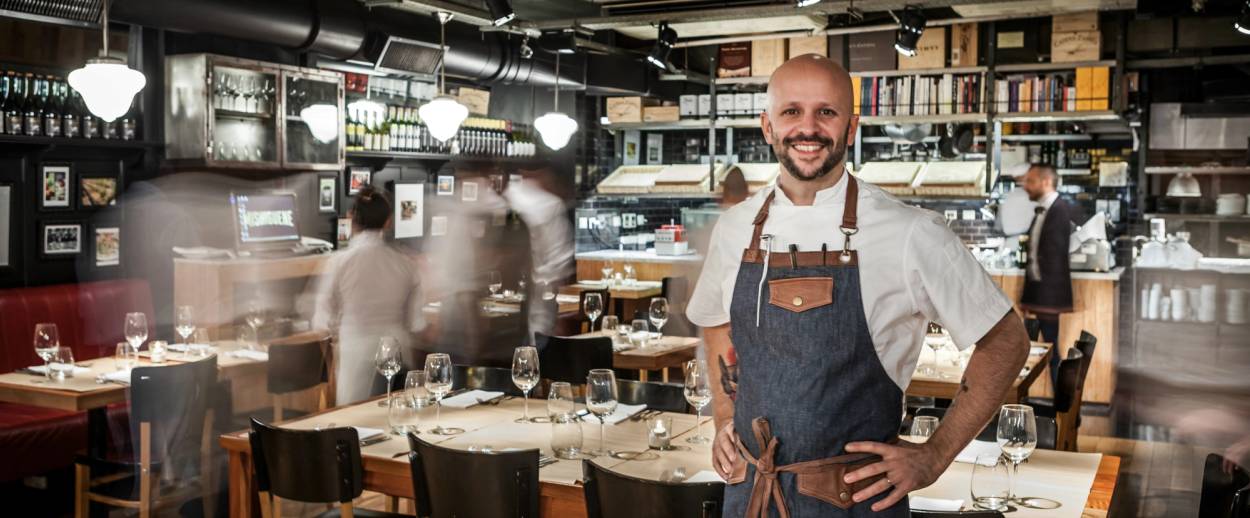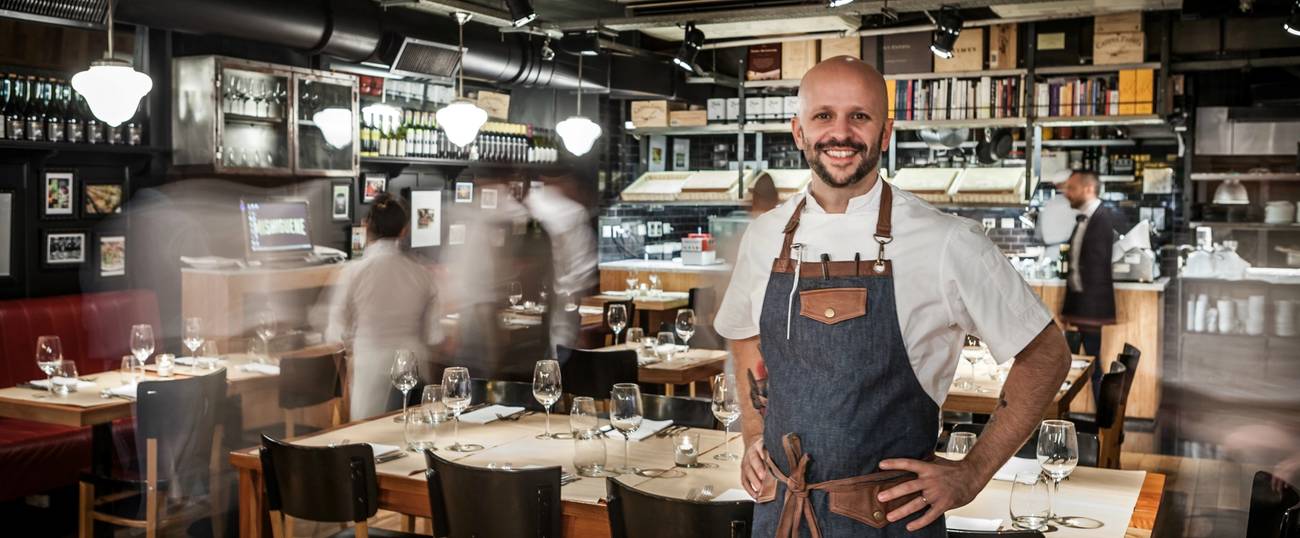Going ‘Crazy’ for Jewish Food
Chef Tomás Kalika updated his Polish grandmother’s recipes at Mishiguene, his popular Buenos Aires restaurant. This week he brings his food to New York.




On Friday nights in Buenos Aires, there’s a party on Lafinur Street. The sound of clinking glasses and lively conversation can be heard through an open door. A warm light glows behind an oversized glass window painted in beguiling gold letters. And then, without warning, the sounds of a clarinet and accordion begin—slowly at first, then increasingly fast and frenzied until the whole place is clapping and stomping in rhythm.
This is Mishiguene. As most Ashkenazi Jews will tell you, the word means “crazy” in Yiddish. But Mishiguene has also become one of the hottest restaurants in Argentina’s capital city. Founded by Jewish-Argentinian chef Tomás Kalika, it serves creative takes on classic foods from global Jewish cuisine: everything from sous-vide gefilte fish wrapped in softened strips of carrot and topped with micro greens and fish roe, to Kalika’s take on Jerusalem mixed grill—which, in a nod to molecular gastronomy, pairs the spiced chicken hearts and livers with hummus foam. “Through my cooking, I share my point of view that Jewish culture is tasty, happy, and sexy,” Kalika told me.
Since late 2014, Kalika has served his highly personal take on modern Jewish cuisine to enthusiastic Argentinian diners. And despite not being religious (he does not observe Shabbat, and with pastrami-flecked ice cream on the dessert menu, the restaurant is decidedly not kosher), Kalika gives diners a special experience on Friday nights, live klezmer music and all. Now he’s ready to bring his food, showmanship, and dining philosophy to the world—first stop: New York City. On September 22 and 23, he will team up with Catena Winery (an influential Argentinian wine producer) for two private dinners at Chefs Club. (The meal will also be available to diners in the main restaurant.)
Like many chefs, Kalika’s path to the stove was all but straight. As a child, he was deeply influenced by the cooking of his Polish grandmother, who kept her family’s traditional dishes alive in Buenos Aires. Varenikes, kugel, borscht, holishkes (stuffed cabbage)—“these things are what we ate,” Kalika said. “It was only when I went to school and started to eat with friends that I realized our food was different.”
Kalika was far less inspired by schoolwork, and spent most of his early teenage years cutting class to play guitar and hang out with friends. “My mother got sick of it, so she sent me to Israel to live on kibbutz and attend a program for struggling teens,” he said. His mom was also was the first person to suggest that he think about becoming a professional chef. Aside from music, Kalika’s other passion was watching cooking shows, and he often cooked dinner for his family, including many of his mother and grandmother’s Jewish recipes.
“‘I think you have more chances to be a good chef than a musician,’ my mother told me,” Kalika said with a laugh. “It was basically like, ‘OK, you suck at guitar.’”
Fortunately, Kalika was intrigued by the idea of cooking professionally. After moving to Jerusalem in the late 1990s, he found a top 10 list of restaurants in Israel and decided to start at the top: a restaurant called Oceanos run by one of the pioneering chefs of modern Israeli cuisine, Eyal Shani.
The restaurant wasn’t looking to hire anyone, but Kalika persisted: “I said, ‘Listen, I am going to work here. If you let me show you how good I am, you will not regret it.” Shani relented and gave him a job as a dishwasher. Over the next decade, he worked his way up the ranks until he was deemed worthy to don a pair of chef’s whites.
There were plenty of bumps along the way. The most painful, he says, came when he opened— and quickly had to close—his first restaurant. “It was a very low stage for me,” he said. “I started to ask myself if I was on the correct path. Did my work feel honest and true enough?”
Around the same time, his friend and business partner Javier Ickowicz suggested they start a restaurant focusing on updated Jewish cuisine. Thinking it over, Kalika realized this was the answer to his questions. Sure, he could make a great hollandaise, but why would he attempt to become a great French chef when he had his own heritage and cuisine to explore? “Mishiguene let me try something new and something that belongs to me,” Kalika said.
At first, customers were skeptical—and at times hostile—toward Mishiguene’s menu. “People would tell me, ‘You are messing with my grandmother’s cuisine. You are destroying the history of the Jewish community in Argentina,’” Kalika said. But their criticism only fueled his drive. Today, thanks to Kalika’s persistence, charisma, and unarguably delicious food, Mishiguene has become one of the most sought after restaurants in Buenos Aires.
In New York, Kalika hopes to continue spreading the gospel of modern Jewish cuisine. “It’s going to be great,” he said. “We are going to rock out.”